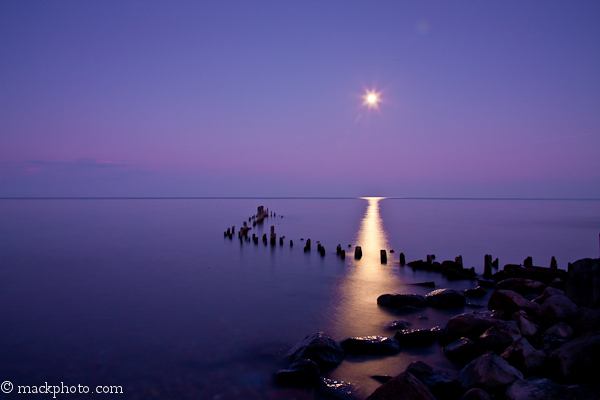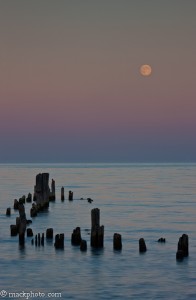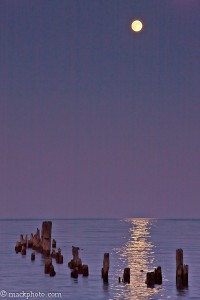On Monday September 12, 2011 I watched my 711th moonrise. OK, I haven’t seen all of them but based on a moonrise every 28 days this is my 711th moonrise. I was down at Lighthouse Beach in Evanston, Illinois, my favorite beach which you know if you’ve been reading this blog. Unfortunately, on this night the clouds were coming in once again which blocked the moonrise until it was high in the sky.
Luckily I had come down the night before, which is always the best night to shoot the full moon because it rises about 25 minutes before sunset giving you have enough ambient light to work with to illuminate the scene. As many of you know I have been shooting this scene for a long time. I have been waiting to get the angle of an old pier to line up with the moonrise in just the right way. In the past the moon has either been too far south or too far north and not directly where I wanted it. Then you have the weather which must be just right as well, so for months, maybe even years, I have been trying to get this shot. So on Sunday night I headed down to the lake front to see if this would indeed be the night. The sky was clear so my hopes were high. As luck would have it I was set up and ready to go well before the appointed time of moonrise, and yet I couldn’t find the moon on the horizon. There was still too much moisture along the horizon so the moon wasn’t visible until it was about 10 above the horizon. So my plan to use a long lens to pull the moon in tight against the pier once again has to wait.
Yet it was still a great night to be there as the sunset was a mixture of blues, reds and purples. With the polarizing filter on the colors were enhanced enough to match what it looked like to the eye. I also used my graduated neutral density filter once the darkness fell to balance the brightness of the moon with the rest of the scene. I found this time I didn’t like the results as it took the colors away from the sky around the moon. The darker it got the more the moonshine on the water came out in the shot. But at that point you tend to lose the detail in the moon. And as the exposures get longer than about ½ second you start to see movement in the moon with longer lenses. In the age of film you couldn’t work as long into the darkness as you can these days and still have usable images. With today’s digital cameras and post processing in Lightroom or Photoshop you can adjust RAW files in to get detail our of shadow areas of underexposed files which means you can expose for the highlights and bring back the shadow areas in post. Knowing this I kept making images well into the darkness, an hour past sunset. The two last images are my favorites from the evening.
There are many moonrises in your life and each one is unique because of where you are when you see them. Each is to be savored. Enjoy them.
Peace,
Richard
PS: To see more images from this shoot follow this link: Moonrise at Lighthouse Beach


